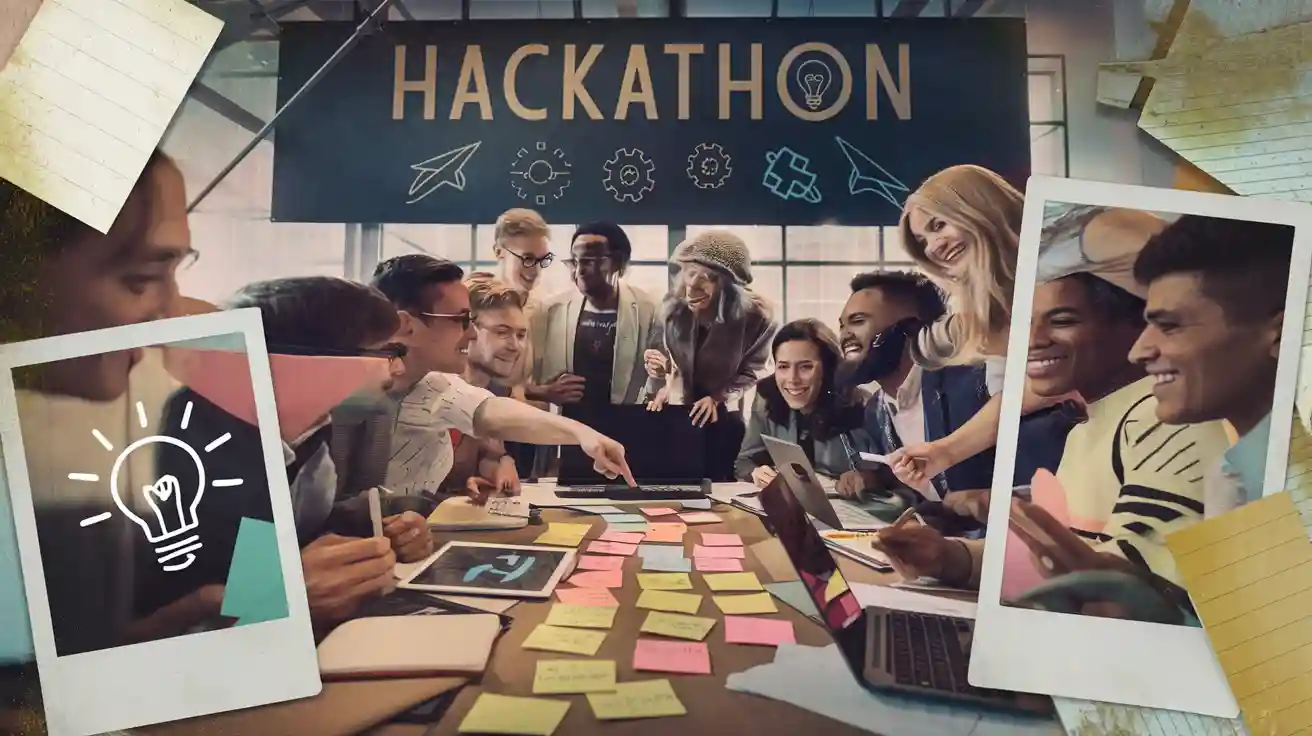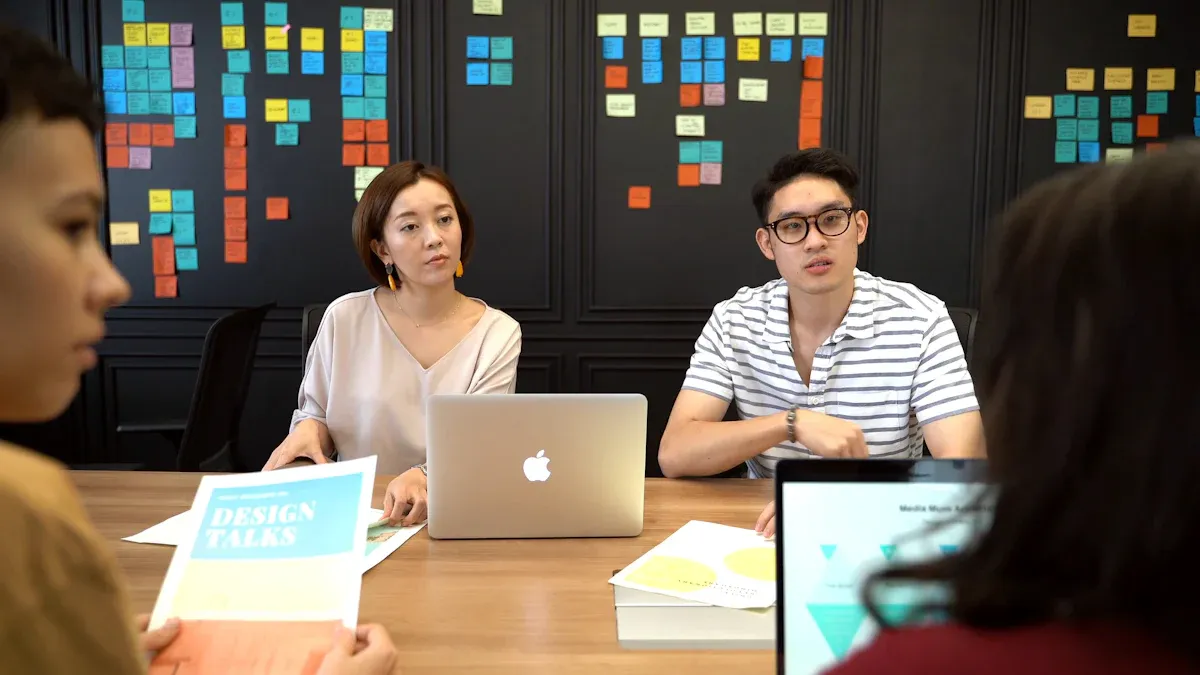How to Join a Hackathon with Zero Coding Background

You might think you need to code to join hackathon events, but that is not true. People from all backgrounds step in and make a difference. In 2023, a hackathon at Craft Docs showed that even customer support staff could help their team win by sharing ideas and improving workflows. You can join a hackathon, bring your creativity, and work with others. Teamwork, fresh thinking, and learning matter just as much as coding.
Key Takeaways
You do not need to know coding to join a hackathon. People with design, research, project management, and pitching skills are important. Teams need many different skills.
Hackathons welcome everyone, no matter your background or skill level. Bring your creativity, ideas, and a desire to learn.
Look for beginner-friendly or no-code hackathons online or near you. Search on websites or ask people you know.
Get ready by signing up early and learning the event rules. Practice using simple tools like no-code apps or drawing.
Build your team by sharing your skills and picking clear roles. Work together with respect and good communication.
Use teamwork tools and ask mentors or teammates for help. This will help you stay organized and feel confident.
Focus on working together, learning new things, and meeting people. These things are more important than winning.
Explain your project clearly and simply so your team stands out. You can do this even if you do not speak in public often.
What Is a Hackathon

Hackathon Basics
A hackathon is a fun event where people come together to solve problems, build new things, or create fresh ideas. You do not need to be a coder to join. Teams often include people with different skills, like design, business, or research. Many hackathons last between 24 and 36 hours, but some are shorter or even stretch over a few weeks. You work with others, share ideas, and learn by doing.
Tip: Hackathons are not just about winning. You get to meet new people, try out your ideas, and learn new things in a friendly setting.
Here are some key parts of a hackathon:
Teams set clear goals and focus on solving real problems.
You can join in person, online, or in a mix of both.
Teams often include beginners and experts, which helps everyone learn.
Mentors and judges help guide you and give feedback.
You learn by working with others, not just by listening to talks.
Component | What It Means for You |
|---|---|
Goal Setting | Your team picks a problem and works toward a clear solution. |
Team Building | You join a group with different skills and backgrounds. |
Mentoring | Experts help you and answer your questions. |
Event Design | You might join a hackathon in person, online, or both. |
Common Myths
You might hear some things about hackathons that are not true. Let’s clear up a few myths:
Only programmers can join.
You must know how to code to help your team.
Hackathons are only for tech experts.
You have to stay up all night.
The truth is, hackathons welcome people from all backgrounds. For example, events like Penn PORES and UCLA’s DataFest bring together students from fields like political science, economics, and statistics. Some hackathons even focus on real-world problems, like healthcare or ethics, and need people with many different skills.
Who Can Join
Anyone can join a hackathon. You do not need to be a tech whiz or have any coding experience. Many hackathons invite people from all walks of life, including students, teachers, artists, and even patients in healthcare events. Some hackathons reach out to kids, girls, and people who have never tried coding before. Teams often succeed because of creative ideas, teamwork, and strong presentations—not just technical skills.
Note: Your unique background and ideas can help your team stand out. You might be the one who comes up with the winning idea!
You will find hackathons that welcome everyone, no matter your age, skill level, or background. All you need is curiosity and a willingness to learn.
Non-Coder Roles

Hackathons need more than just coders. You can join a team and make a big impact, even if you do not write a single line of code. Many winning teams have members who focus on design, project management, or research. Let’s look at how these roles help everyone succeed.
Design
Designers help turn ideas into real products. You might sketch out what an app looks like, pick colors, or make sure everything is easy to use. Good design makes a project stand out. Sometimes, simple hand-drawn sketches can help your team share ideas quickly. You do not need fancy tools or years of experience. Many people start by drawing on paper or using free online tools.
Designers often create user-friendly layouts.
You can help make sure the project works for everyone, including kids or people with special needs.
Your work can include making logos, slides, or even fun illustrations.
Tip: In one hackathon, a team used simple, child-friendly drawings to help kids with autism. The design was based on research and made the project easy to understand.
Project Management
Every team needs someone to keep things on track. As a project manager, you help everyone stay organized. You might set goals, make a plan, and check that everyone knows what to do next. You do not need to be the boss. Instead, you help the group work together and finish on time.
Make a list of tasks and help assign them.
Remind the team about deadlines.
Keep everyone talking and sharing updates.
A good project manager helps the team stay calm and focused, even when things get busy. You make sure everyone’s ideas get heard.
Research
Research is a secret weapon in hackathons. You can look up facts, study what others have done, or find out what users need. This helps your team build something that really solves a problem. You do not need to be an expert. Just being curious and willing to dig for answers can make a huge difference.
Find out what users want or need.
Check out what other teams or companies have built.
Share your findings so your team can make smart choices.
Note: In one hackathon, a team with almost half non-coders used research and simple design to build a working prototype. They ranked in the top 10 out of more than 50 teams. Their success came from teamwork, good communication, and learning from mentors.
Non-Coder Role | What You Can Do | Why It Matters |
|---|---|---|
Design | Sketch, create layouts, make things look great | Helps users enjoy and use the product |
Project Management | Organize, plan, keep team on track | Makes sure the project gets finished |
Research | Gather info, study users, check competitors | Builds smarter, user-friendly ideas |
You do not need to code to help your team shine. Your skills in design, project management, or research can lead to creative solutions and help your team stand out.
Pitching
Pitching is all about sharing your idea with others. At the end of a hackathon, you and your team get a few minutes to show what you built. You want to make people excited about your project. You do not need to be a public speaking expert. You just need to tell a clear story.
When you pitch, you help your team stand out. Judges and other teams listen to your story. They want to know what problem you solved and why your solution matters. You can use slides, drawings, or even a quick demo. Sometimes, a simple story works better than fancy words.
Here are some ways you can help with pitching:
Write a script that explains your project in simple words.
Practice speaking so you sound confident and clear.
Make slides or posters that show your idea.
Answer questions from judges or other teams.
Share why your project is special and how it helps people.
Tip: Try to keep your pitch short and easy to follow. Use real-life examples or stories to help people understand your idea.
You do not have to do this alone. Work with your team to decide who will speak and who will help with slides or demos. You might be the one who tells the story, or you might help behind the scenes. Both jobs matter.
Pitching Task | What You Can Do | Why It Helps Your Team |
|---|---|---|
Script Writing | Write what to say | Keeps the pitch clear |
Slide Design | Make slides or posters | Shows your idea visually |
Practice | Rehearse with your team | Builds confidence |
Q&A | Answer questions | Shows you know your project well |
Pitching is your chance to shine, even if you have never coded before. You help your team share their hard work and ideas with the world. Sometimes, a great pitch can make all the difference.
Join a Hackathon: Getting Started
Find Events
You can find a hackathon almost anywhere these days. Many schools, colleges, and tech groups host events for all skill levels. Some hackathons are in person, but many are online, so you can join from home. If you want to join hackathon events as a beginner, look for ones that say “no-code” or “beginner-friendly.” These events welcome people with little or no coding experience.
Here are some easy ways to find your first hackathon:
Search for “no-code hackathon” or “beginner hackers” on Google or social media.
Check websites like Devpost, Hackathon.com, or Eventbrite for upcoming events.
Ask teachers, friends, or local tech clubs if they know about any hackathons.
Look for events at your school or library.
Tip: Many beginner-friendly hackathons focus on teamwork, creativity, and real-world impact. You get to build new ideas, help your community, and learn skills like design or research.
When you join hackathon events, you can expect to:
Share unique ideas and show your creativity.
Work on projects that help your school or community.
Learn about teamwork and how to include everyone.
Try out new tools, like AI or no-code platforms.
Choose the Right Hackathon
Not every hackathon is the same. Some focus on business, health, or the environment. Others want you to use certain tools or solve special problems. You should pick an event that matches your interests or background. This helps you feel more comfortable and excited to join hackathon activities.
Here’s how you can choose the right hackathon for you:
Read the event description to see if it matches what you like.
Check if the hackathon welcomes people with your skills or interests.
Look for events that highlight teamwork, creativity, or social impact.
See if the event is open to everyone or just for a certain group, like students or women.
Organizers often design hackathons for specific groups. For example, some events invite only students, while others focus on women in tech or people new to coding. Picking the right event helps you meet people like you and work on projects that matter to you.
Note: Some hackathons use special tools to match you with a team based on your skills or interests. This makes it easier for you to find your place and contribute.
You might see open hackathons that welcome everyone, or closed ones for a certain community. Open events help you meet new people and learn from different backgrounds. Closed events let you focus on a topic you care about with people who share your interests.
Sign Up and Prepare
Once you find the right event, it’s time to sign up. Most hackathons have an online form where you enter your name, skills, and interests. Some ask you to join a team before the event, while others help you find a team on the day.
Here’s what you can do to get ready:
Register early to save your spot.
Read the event rules and schedule.
Think about what skills you can bring, like design, research, or pitching.
Gather simple tools, like paper for sketches or free online apps for notes.
Practice telling your story—why you want to join a hackathon and what you hope to learn.
When you join hackathon events and prepare well, you boost your chances of success. Organizers track how many people sign up, how many projects teams finish, and how creative the ideas are. They also look at teamwork, skill growth, and how many people keep coming back for more hackathons.
You can measure your own success by:
Finishing a project with your team.
Learning a new skill, like using a no-code tool or making a pitch.
Making new friends and building your network.
Seeing your idea make a real difference in your school or community.
Remember: Every time you join a hackathon, you grow your skills, build confidence, and help your team shine. Even if you don’t win, you gain experience that lasts a lifetime.
Building Your Team
Team Formation
You do not have to know everyone before you join a hackathon. Many people meet their team for the first time at the event. Team formation can feel a bit like a game. You look for people with different skills and ideas. Some hackathons help you match with others based on your interests. Others let you walk around and chat until you find a group that feels right.
Here are some ways to build a strong team:
Look for people who want to solve the same kind of problem as you.
Try to mix skills—find someone who likes design, another who enjoys research, and maybe someone who wants to pitch.
Be open to new friends. Sometimes, the best teams come from people who just met.
Join icebreaker games or team-building activities. These help you get to know each other fast. Research shows that fun challenges, like scavenger hunts or mini escape rooms, help teams build trust and work together better.
Tip: Teams that eat together or play a quick game before starting often feel more connected and ready to work.
Communicate Your Skills
Once you join a team, you need to share what you are good at. Maybe you love drawing, or you are great at organizing tasks. Tell your team about your strengths. This helps everyone know how you can help.
You can use a simple table to show your skills:
Name | Skill | How I Can Help |
|---|---|---|
You | Drawing | Make sketches |
Alex | Research | Find facts and ideas |
Jamie | Speaking | Pitch to judges |
When you talk about your skills, you make it easier for your team to plan. You also help others feel comfortable sharing what they can do. Teams that talk openly about their skills finish projects faster and have more fun.
Define Your Role
After you share your skills, you and your team can decide who does what. You might be the designer, the researcher, or the person who gives the final pitch. Clear roles help everyone stay focused and avoid confusion.
Here are some quick steps to define your role:
Pick one main job you want to do.
Ask your team if anyone needs help with their tasks.
Stay flexible. Sometimes, you might switch roles if someone needs a hand.
Note: Teams that set clear roles and goals at the start often finish their projects on time and feel proud of their work. Studies show that teams with clear roles and good teamwork grow faster and solve problems better.
Remember, every team needs all kinds of people. Your unique skills and ideas can help your team stand out and maybe even win!
First Hackathon Tips
Jumping into your first hackathon can feel exciting and a little scary. You might wonder how to keep up or what tools to use. Don’t worry! You have lots of ways to make your first hackathon a great experience, even if you don’t code. Here are some tips to help you shine.
Leverage No-Code Tools
Your secret weapon? No-code tools! These amazing platforms let you build real, working apps just by dragging, dropping, and typing. Forget complex code – you get to focus purely on your awesome ideas.
Tools like Momen are super handy here. They let you build a complete app visually, from how it looks (the frontend) to how it works behind the scenes (the backend, data, and even smart AI features). Imagine designing your app's look with something like Lovable, then easily connecting it to Momen to make it smart and functional. You can add AI assistants, custom chatbots, manage data, and link to other services, all without touching code.
This means you can bring your app idea to life super fast. Whether you're a creative thinker, a great organizer, or just have a brilliant solution, no-code tools empower you to build and contribute meaningfully at any hackathon!Tip: Try out a no-code tool before your first hackathon. You’ll feel more confident and ready to help your team.
Use Collaboration Platforms
Your first hackathon will move fast. You need to work with your team, share ideas, and keep track of tasks. Collaboration platforms make this easy. These tools help you chat, share files, and work together in real time.
Many teams use tools like Slack, Miro, or Figma. These platforms let you talk to your team, get feedback from mentors, and update your project quickly. In virtual hackathons, these tools become even more important. They help you stay connected, even if you’re not in the same room. Features like live chat, breakout rooms, and whiteboards make teamwork feel natural and fun.
Studies show that teams using collaboration platforms finish projects faster and feel happier working together. You can ask questions, share updates, and get instant support from mentors or teammates.
Note: Keep your team’s chat open during your first hackathon. Quick messages and updates help everyone stay on track.
Ask for Help
You don’t have to know everything at your first hackathon. Mentors are there to guide you. They can answer questions, suggest ideas, or help you fix problems. If you get stuck, just ask! Most mentors love to support beginners and want you to learn.
You can also ask your teammates for help. Maybe someone knows a tool you haven’t tried or has a smart way to solve a problem. When you ask for help, you learn faster and help your team grow stronger.
Raise your hand in group chats if you’re confused.
Ask mentors for feedback on your project.
Share your ideas and listen to others.
Remember: Your first hackathon is about learning, not being perfect. Every question you ask helps you and your team do better.
Succeeding at Your Hackathon
Teamwork
You can achieve more when you work together. Teamwork helps you solve problems faster and makes the experience more fun. Every person brings something special to the table. Maybe you are great at organizing, or you love sharing new ideas. When you listen to each other and share tasks, your team can finish projects on time and feel proud of the results.
Try these tips for better teamwork:
Set clear goals with your team at the start.
Share your ideas and listen to others.
Divide tasks so everyone has a job.
Celebrate small wins together.
Teams that talk often and help each other usually finish stronger. You might even make new friends who want to join your next hackathon.
Learning and Growth
A hackathon is a great place to learn new things. You get to try out new tools, ask questions, and see how others solve problems. Mentors are there to guide you and answer your questions. They can show you shortcuts, suggest new ideas, or help you fix mistakes. When you ask for help, you learn faster and feel more confident.
You can measure your growth in many ways:
Did you learn a new skill or tool?
Did you help your team solve a tough problem?
Did you try something new, even if it felt hard?
Remember, every hackathon is a chance to grow. You might not win a prize, but you will leave with new skills and more confidence.
Networking
You meet lots of people at a hackathon. Some might become friends, mentors, or even future teammates. Building your network helps you find new opportunities and learn from others. You can connect with people by joining group chats, asking questions, or sharing your ideas.
Here are some ways to build a strong network:
Talk to people from different teams.
Ask for feedback from judges or mentors.
Stay in touch after the event.
You can track your networking success in many ways:
How many new contacts did you make?
How often do you talk with your new connections?
Did any of your contacts lead to new projects or job offers?
Number of Connections: Focus on making quality contacts, not just a big list.
Frequency of Interactions: Stay active by joining events or following up.
Response Rates: Notice who replies and wants to work with you.
Conversion Rates: See if your connections lead to real results, like new projects or referrals.
Many people find that their network helps them get freelance work, join new teams, or even organize their own events. When you show curiosity and support others, you build strong relationships that last.
You can join a hackathon, no matter your background or skill set. People from all ages, genders, and fields work together and learn from each other.
Teams with both younger and older adults often see the most growth.
Female participation rises when design roles are included.
When you join, you build skills, meet new friends, and boost your confidence. Many first-timers see big wins, like higher engagement and faster results:
Project Name | Success Metrics |
|---|---|
Postt (1st Place) | |
Due Diligence Agent | 85% faster, 92% accuracy, <5% false positives |
Ready to start? Sign up for a local event or join an online hackathon community. Your ideas matter—take that first step! 🚀
FAQ
Do I need to know how to code to join a hackathon?
No, you don’t! Many teams need people who can design, organize, research, or pitch ideas. You can help your team in many ways without writing any code.
What should I bring to my first hackathon?
Bring a notebook, a pen, your laptop (if you have one), and a charger. You might want snacks and water, too. Most of all, bring your curiosity and a positive attitude!
How do I find a team if I don’t know anyone?
Most hackathons help you meet new people. You can join team-building games or chat with others at the event. Just introduce yourself and share your interests. Teams love new ideas!
What if I feel nervous or lost during the event?
That’s normal! Everyone feels that way at first. Ask mentors or teammates for help. Take a deep breath and remember, you’re here to learn and have fun.
Can I use online tools if I can’t code?
Absolutely! Try no-code tools like Canva, Miro, or Google Forms. These help you design, organize, and share ideas without any coding. Your team will appreciate your creativity.
What do judges look for in hackathon projects?
Judges want to see teamwork, creativity, and clear solutions. They love projects that solve real problems and have a good story. You can help your team shine by sharing your ideas and working together.
Will I get anything if my team doesn’t win?
Yes! You’ll learn new skills, meet new friends, and build your confidence. Many people say the experience is more valuable than any prize. You might even get a certificate or cool swag!
See Also
Seven Best No-Code Solutions For Founders Without Coding Skills
How Momen’s No-Code Strategy Solves DevOps Difficulties
Top No-Code Platforms Ideal For Freelancers In 2025
No-Code Development Costs Explained And How To Pick Platforms

